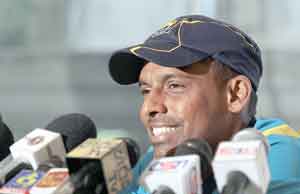Thilan calls social media a ‘huge distraction’

Thilan Samaraweera is a non-believer in Social Media, which he has negative thoughts on it - File pic
Sri Lanka’s new batting coach wants cricketers to reduce their presence on social media and concentrate on cricket. Calling social media a “huge distraction” for modern day cricketers, Thilan Samaraweera said that “the loads of crap” you find across various internet platforms have placed the players under tremendous pressure.
“Social media, it seems to me, is a huge a distraction for modern cricketers,” the former Sri Lankan middle-order batsman said, a day after he landed in the country to accept his first major contract as a batting coach. He has secured a three-year deal which runs beyond the 2019 World Cup. “There’s a lot of pressure coming from social media these days,” he said, “and only way to avoid them is by reducing your own presence in these platforms.”
Samaraweera retired from international cricket in March 2013 when selectors excluded him from the home series against Bangladesh. But five years later, he is back with the national team as batting coach and his first assignment is against India. Now, the 41-year-old wants to infuse self-confidence among the players to start winning.
“Winning is a habit, just as losing is,” Samaraweera told the Sunday Times. “And I think they have forgotten how to make winning a habit. These cricketers are extremely talented as players in any other team in the world but they need to keep their brains fit while working on their physical strength.”
Although Sri Lanka has undergone a rough patch in recent months across all formats, they recorded a surprise victory against Pakistan in UAE in a Test series. Most teams struggle to beat Pakistan in UAE, their adopted home.
“Beating Pakistan in UAE was indeed a huge achievement and that shows what they are capable of,” Samaraweera pointed out. “It was a series many thought we would lose but look how Sri Lanka turned it around. If we can do it against Pakistan, we can certainly do it against India. The only thing is, we need to be focused.”
Sri Lanka beat Pakistan 2-0 in the Test series but got whitewashed in the limited-over series which included five ODIs and three T20 internationals.
Samaraweera started out as an off-spinner but ended it as third in the list of Sri Lankan cricketers with best averages in Test cricket–a rare feat by a player whose career was nearly halted when a bullet pierced through his knee during the 2009 terrorist attack on the Lankan cricketers in Lahore. His average of 48.75 is only second to Kumar Sangakkara (57) and Mahela Jayawardene (49), pointing to the dedication and hard work he had put in.
“We have seen players glorified and compared to the greats of the game after few good performances,” he said. “In the same way, they are named and shamed after a few bad performances. I think these distractions have placed cricketers under so much pressure. I personally believe they should leave social media or at least reduce their presence as much as possible.”
Samaraweera also underlined the importance of strong work ethic to excel continuously for a longer period of time
Most cricketers have great start to their careers but often struggle as time elapses. A good example is Kusal Mendis, who was regarded as the next big name in Sri Lanka cricket after his mesmerizing performance against Australia that led Sri Lanka to a record 3-0 whitewash. Today, he is not in contention for a place in the national Test side.
“I think the first 15 international matches are often the easiest for a player to perform but it changes when the opposition teams start to analyze your game,” Samaraweera said. “This is where the real test is and I have seen lot of players who have a great start who struggle later on in their careers. This is why I said the players need to have their focus on the game.”
Samaraweera, who now domiciled in Australia, is not looking to make drastic changes. He will consider the technical, tactical and mental aspects of the batsmen in the ensuing years.
“This is a huge challenge for me personally but I accepted this with great enthusiasm,” he said. “I don’t think I can do much during the current series in India except giving them confidence but this will certainly help me to understand and gel with players; assess different personalities and their requirements. Once I get a fair assessment on each and every individual player, I will start working with them in helping them to lift their game.”
Since retirement, Samaraweera stayed connected to cricket by mentoring. Before taking up a full-time role with Sri Lanka Cricket, he has worked as a batting consultant for the Bangladesh cricket team and the Australian team.


